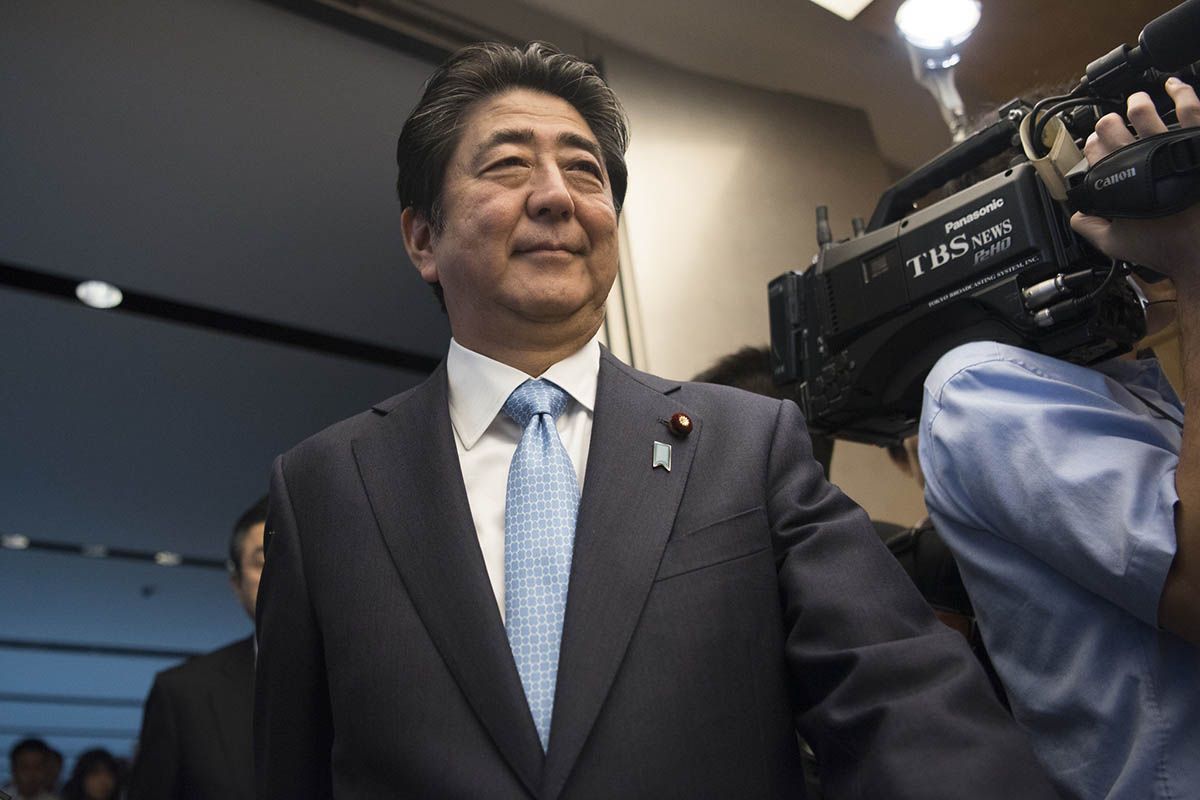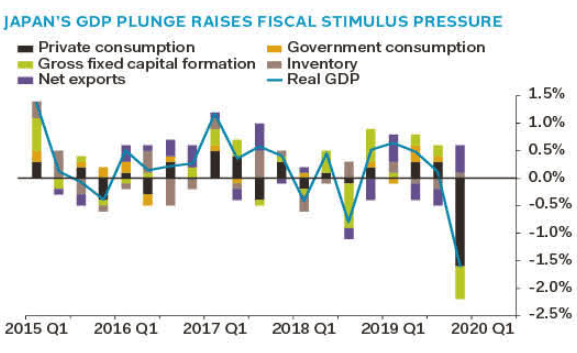Japanese Yen: Economy Shrinks 6.3% Leading to Expectations for BoJ Stimulus
- Japan's economy plummets in late 2019
- BoJ easing would make JPY less attractive
- For now JPY remains firmly fixated on global investor sentiment

Above: File image of Japanese Prime Minister Shinzo Abe. Image © Chairman of the Joint Chiefs of Staff, accessed Flickr, reproduced under CC licensing.
Japan's economy shrank by 1.6% in the final quarter of 2019 courtesy of the Government's decision to hike sales taxes, the decline that was far greater than the -1.0% decline markets had been expecting.
The year-on-year decrease for the fourth quarter is meanwhile left at -6.3%, significantly deeper than the -3.7% that had been forecast.
Economists are meanwhile sceptical that the economy will experience a sharp rebound in early 2020 owing to the emergent coronavirus threat and the data will likely heap further pressure on the government and monetary authorities to come up with measures that will support the economy.
The final mix of monetary and fiscal support that is announced could in turn have a bearing on how the Japanese Yen trends over the course of 2020.
Any potential supportive measures announced by the Bank of Japan will likely enhance the Yen's attractiveness as a funding currency, meaning the currency will likely remain highly exposed to the sentiment of domestic and international investors which currently does not favour the Yen.
The Pound-to-Yen exchange rate is trading at 143.200, placing it in the middle of the December-February range of 141-1.4457. We see little likelihood of this range being broken over coming days or the next few weeks.
The Dollar-Yen exchange rate is quoted at 109.86, up 0.10% on the day and near the top end of its 2020 range, the high for the year so far is at 110.29 and the Dollar remains favoured in the current environment.
The plunge in Japanese GDP was driven by a 3.0% decline in private consumption in the fourth quarter which followed a 0.4% rise in third quarter. Consumption plummeted after the hike in the country's sales tax rate from 8% to 10% in October 2019.

"We’ve consistently warned that policymakers were underestimating tax-hike damage," says Freya Beamish, Chief Asia Economist at Pantheon Macroeconomics Ltd. "We expect some upward revisions based on inventory, but overall, the picture was grim. Even with the Q4 plummet, it still seems likely that GDP will fail to recover in Q1 in the context of the shock to exports from the virus and shutdowns in China, alongside the damage to tourism and confidence domestically."
Beamish says the data will add weight to calls for Prime Minister Shinzo Abe to announce a further stimulus package.
The GDP data revealed that the weakness in the economy was also evident in business investment which contracted by 3.7% in the fourth quarter, following an expansion of 0.5% in the third quarter.
"The scale of economic weakness was surprising given that Japan’s government had put in place policy measures in an attempt to dampen the
negative hit from the 2 percentage point sales tax hike implemented at the start of October. It will raise doubts over underlying health of Japan’s economy and its ability to rebound in the coming quarters," says Lee Hardman, Currency Analyst at MUFG Bank Ltd.
But for the Yen's outlook, domestic data or events barely seem to have any impact as the currency remains firmly wedded to global investor sentiment and investor flows.
The currency remains a key safe-haven currency in that it tends to rise when global markets are fretful and fall when markets are in a bullish mode.
The ongoing stock market rally - that comes despite coronavirus fears in China - therefore does not lend itself to Japanese Yen strength. We would only expect the Yen to rally in the event that markets show a decidedly more negative reaction to coronavirus developments.
"Medium term USD/JPY outlook is bearish on the back of increasing uncertainties surrounding the coronavirus outbreak that could on-and-off send markets easily into risk aversion mode," says a market note from Malaysia's Hong Leong Bank.
However, we are also aware that given Japan's proximity to China, as well as the strong trade links with China, a flareup in coronavirus fears could only exacerbate the economy's problems and entrench the slowdown. This could in turn invite an aggressive response from the Bank of Japan, which would only undermine the Yen.
"The prospect of further BoJ stimulus should help to keep the yen weak," says Hardman. "The recent emergence of the coronavirus and potential disruption to growth at the start of this year reinforces downside risks to growth in the near-term. In these circumstances, policymakers in Japan find themselves under increased pressure to deliver additional stimulus both in the form of either fiscal and/or monetary easing."
Therefore, we wonder if there are other currencies that would have better safe-haven qualities in times of market anxiety caused by the coronavirus.
The Dollar is the obvious choice as the U.S. economy is relatively insulated to China, hence betting on a recovery in the Yen in the near-term does not appear to offer attractive risk-reward dynamics.
